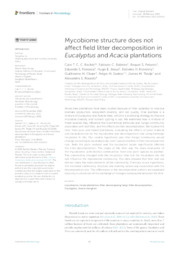Mycobiome structure does not affect field litter decomposition in Eucalyptus and Acacia plantations.
Mycobiome structure does not affect field litter decomposition in Eucalyptus and Acacia plantations.
Author(s): RACHID, C. T. C. C.; BALIEIRO, F. de C.; PEIXOTO, R. S.; FONSECA, E. S.; JESUS, H. E.; NOVOTNY, E. H.; CHAER, G. M.; SANTOS, F. M.; TIEDJE, J. M.; ROSADO, A. S.
Summary: Mixed tree plantations have been studied because of their potential to improve biomass production, ecosystem diversity, and soil quality. One example is a mixture of Eucalyptus and Acacia trees, which is a promising strategy to improve microbial diversity and nutrient cycling in soil. We examined how a mixture of these species may influence the biochemical attributes and fungal community associated with leaf litter, and the effects on litter decomposition. We studied the litter from pure and mixed plantations, evaluating the effects of plant material and incubation site on the mycobiome and decomposition rate using litterbags incubated in situ. Our central hypothesis was litter fungal community would change according to incubation site, and it would interfere in litter decomposition rate. Both the plant material and the incubation locale significantly affected the litter decomposition. The origin of the litter was the main modulator of the mycobiome, with distinct communities from one plant species to another. The community changed with the incubation time but the incubation site did not influence the mycobiome community. Our data showed that litter and soil did not share the main elements of the community. Contrary to our hypothesis, the microbial community structure and diversity lacked any association with the decomposition rate. The differences in the decomposition pattern are explained basically as a function of the exchange of nitrogen compounds between the litter.
Publication year: 2023
Types of publication: Journal article
Unit: Embrapa Soils
Observation
Some of Embrapa's publications are published as ePub files. To read them, use or download one of the following free software options to your computer or mobile device. Android: Google Play Books; IOS: iBooks; Windows and Linux: Calibre.
Access other publications
Access the Agricultural Research Database (BDPA) to consult Embrapa's full library collection and records.
Visit Embrapa Bookstore to purchase books and other publications sold by Embrapa.

